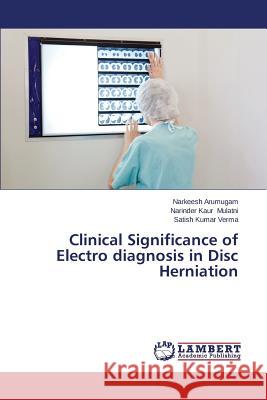Clinical Significance of Electro Diagnosis in Disc Herniation » książka
Clinical Significance of Electro Diagnosis in Disc Herniation
ISBN-13: 9783659316432 / Angielski / Miękka / 2014 / 252 str.
Low Back Ache is one of the greatest afflictions. Most of Physicians/Surgeons/Physiotherapists preferred to diagnose disc herniation through MRI. But some of the studies have proved that MRI is not reliable as it gives false positive findings in asymptomatic patients also. As many as 1377 patients with low back ache participated in this descriptive study.The Physicians preferred radiological tools to diagnose LBA as follows: X-Ray (76%), CT Scan (19%), Discography (0%), Myelography (8%) and MRI (54.61%).However, in 37.92% cases, MRI reports showed abnormalities in the disc, whereas on clinical examination no such problem appeared in the patients. The Study established a statistically significant relationship between Clinical diagnosis, Radio diagnosis and Electrodiagnisis in PIVD. However, it is not at all suggestive in PIVD cases & MRI associated with high false positive results. Similarly, electrodiagnosis is found to be a valid, sensitive, non-invasive, cost effective and useful method to assess the lumbosacral nerve root functions in patients with lumbar disc herniation. It must be incorporated in the routine investigations of the patients suffering from PIVD.
Low Back Ache is one of the greatest afflictions. Most of Physicians/Surgeons/Physiotherapists preferred to diagnose disc herniation through MRI. But some of the studies have proved that MRI is not reliable as it gives false positive findings in asymptomatic patients also. As many as 1377 patients with low back ache participated in this descriptive study.The Physicians preferred radiological tools to diagnose LBA as follows: X-Ray (76%), CT Scan (19%), Discography (0%), Myelography (8%) and MRI (54.61%).However, in 37.92% cases, MRI reports showed abnormalities in the disc, whereas on clinical examination no such problem appeared in the patients. The Study established a statistically significant relationship between Clinical diagnosis, Radio diagnosis and Electrodiagnisis in PIVD. However, it is not at all suggestive in PIVD cases & MRI associated with high false positive results. Similarly, electrodiagnosis is found to be a valid, sensitive, non-invasive, cost effective and useful method to assess the lumbosacral nerve root functions in patients with lumbar disc herniation. It must be incorporated in the routine investigations of the patients suffering from PIVD.











